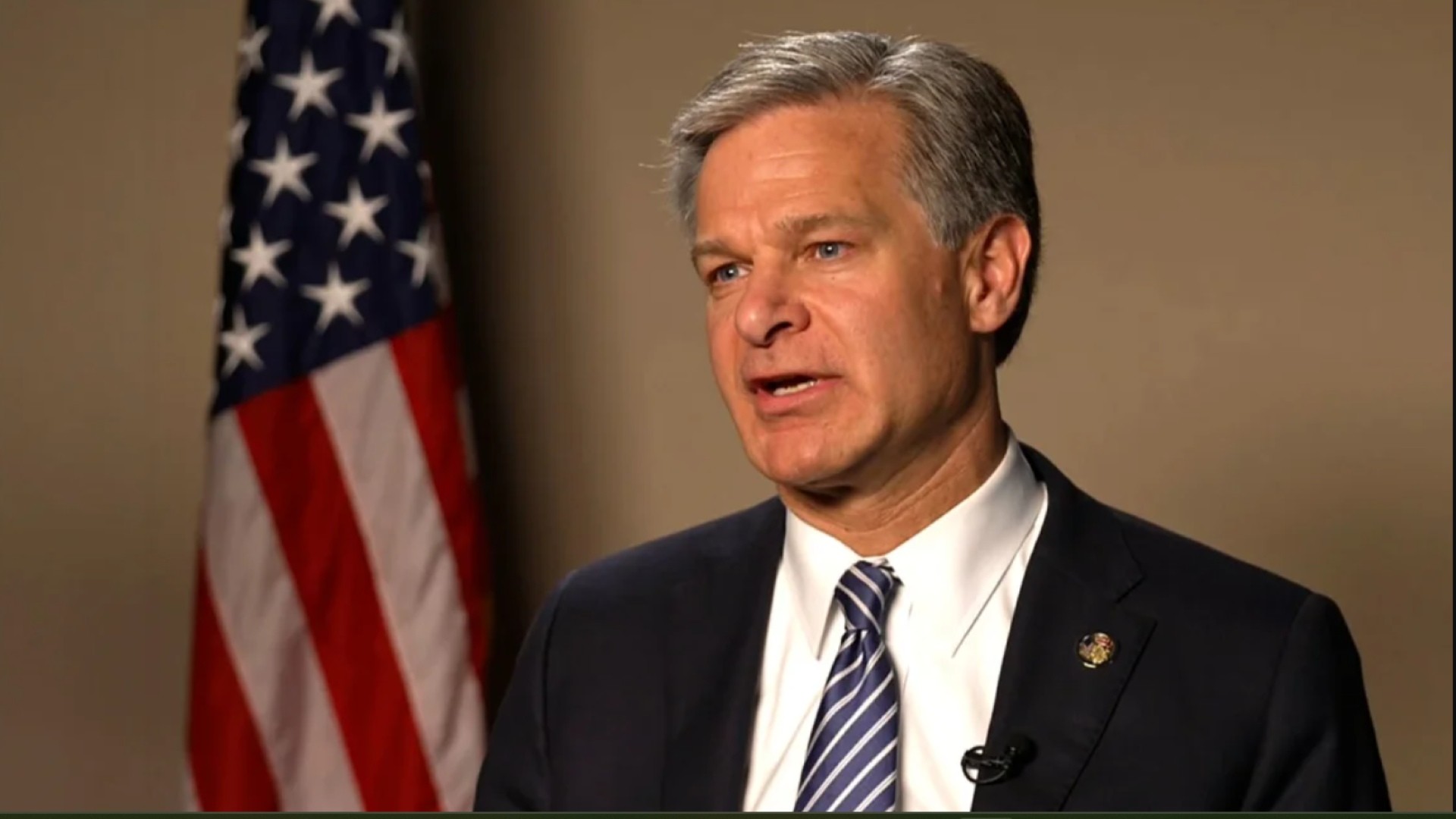Who is Chris Wray: Bio, Career, and Net Worth
FBI Director Chris Wray will step down from his post early next year, the bureau said , after U.S. president-elect Donald Trump signalled his intent to fire the veteran official and replace him with firebrand Kash Patel.
"After weeks of careful thought, I've decided the right thing for the bureau is for me to serve until the end of the current administration in January and then step down," Wray told FBI employees today, the agency said in a statement.
 |
Early Life and Background
Christopher Asher Wray, widely known as Chris Wray, was born on December 17, 1966, in New York City, New York, USA. Raised in a well-educated family, Wray's father, Cecil Wray, was a prominent lawyer, and his upbringing emphasized the value of education and public service. He attended the Buckley School and Phillips Academy, two prestigious preparatory schools known for their rigorous academics and tradition of excellence.
Wray continued his education at Yale University, where he graduated with a Bachelor of Arts in Philosophy in 1989. During his time at Yale, he was recognized for his intellectual curiosity and leadership abilities. He then attended Yale Law School, earning his Juris Doctor in 1992. While at Yale Law School, Wray served as the executive editor of the Yale Law Journal, showcasing his dedication to legal scholarship.
Early Legal Career
After graduating from Yale Law School, Chris Wray began his legal career as a clerk for Judge J. Michael Luttig of the U.S. Court of Appeals for the Fourth Circuit. This prestigious clerkship provided him with invaluable experience and connections in the legal field. Following his clerkship, Wray joined the Atlanta-based law firm King & Spalding, where he specialized in white-collar crime and regulatory enforcement cases.
Wray’s early career at King & Spalding allowed him to hone his skills as a litigator, representing corporations and individuals in complex legal disputes. His expertise in handling high-profile cases gained him recognition as one of the top attorneys in his field.
Service in the Department of Justice
In 2001, Chris Wray transitioned from private practice to public service, joining the U.S. Department of Justice (DOJ) as Associate Deputy Attorney General. His appointment coincided with the aftermath of the September 11 terrorist attacks, a period of significant transformation and heightened security concerns in the United States.
 |
Wray quickly rose through the ranks, serving as Principal Associate Deputy Attorney General before being appointed Assistant Attorney General for the Criminal Division in 2003 by President George W. Bush. In this role, he oversaw major federal criminal investigations and prosecutions, including cases involving corporate fraud, public corruption, and terrorism. Some of his notable contributions during this time include:
-
Corporate Fraud Task Force: Wray played a key role in the Enron scandal investigation, which led to the prosecution of several top executives involved in one of the largest corporate fraud cases in U.S. history.
-
Anti-Terrorism Efforts: He worked closely with intelligence and law enforcement agencies to strengthen the DOJ’s counterterrorism initiatives.
-
White-Collar Crime Prosecutions: Under his leadership, the Criminal Division aggressively pursued cases of securities fraud, healthcare fraud, and other financial crimes.
Wray received the Edmund J. Randolph Award, the highest honor the DOJ can bestow, for his outstanding service to the department.
Return to Private Practice
In 2005, Chris Wray returned to King & Spalding, where he became a partner and chaired the firm’s Special Matters and Government Investigations Practice Group. In this capacity, he represented multinational corporations and high-profile individuals in regulatory and criminal investigations. Wray’s work focused on helping clients navigate complex legal and compliance challenges, often involving interactions with federal and state agencies.
Appointment as FBI Director
On August 2, 2017, Chris Wray was sworn in as the 8th Director of the Federal Bureau of Investigation (FBI), succeeding James Comey. His nomination by President Donald Trump was confirmed by the Senate in a bipartisan vote of 92-5. Wray’s appointment came during a tumultuous time for the FBI, as the agency faced intense political scrutiny and challenges related to its independence and public trust.
As FBI Director, Wray has emphasized the following priorities:
-
Counterterrorism: Strengthening the FBI’s ability to combat domestic and international terrorist threats.
-
Cybersecurity: Addressing the growing threat of cyberattacks and enhancing the FBI’s capabilities to protect critical infrastructure and sensitive data.
-
Counterintelligence: Safeguarding U.S. national security against espionage and foreign interference, particularly from adversaries like China and Russia.
-
Public Corruption: Investigating and prosecuting cases involving abuse of public office and government corruption.
-
Organizational Integrity: Upholding the FBI’s core values of accountability, transparency, and independence.
Wray’s tenure as FBI Director has been marked by significant challenges, including the investigation into Russian interference in the 2016 presidential election, the January 6, 2021, Capitol riot, and rising concerns about domestic extremism. Despite facing criticism from both sides of the political spectrum, Wray has maintained his commitment to the FBI’s mission of protecting the American people and upholding the Constitution.
Leadership Style
Chris Wray is widely regarded as a calm, methodical, and apolitical leader. Colleagues and subordinates describe him as measured and deliberate, qualities that have helped him navigate the complexities of leading a federal agency under intense political and public scrutiny. Wray’s emphasis on the rule of law and institutional integrity has earned him respect within the FBI and the broader law enforcement community.
Personal Life
Chris Wray is married to Helen Garrison Wray, whom he met during his time at Yale. The couple has two children and resides in the Washington, D.C., area. Wray is known to be a private individual who keeps his personal life out of the public eye. He enjoys outdoor activities such as hiking and fishing and is an avid reader of history and philosophy.
Net Worth
As of 2024, Chris Wray’s estimated net worth is approximately $10 million. His wealth primarily stems from his successful legal career, including his partnership at King & Spalding, and his government salary as FBI Director. While public service roles typically offer modest compensation compared to private sector opportunities, Wray’s prior work in corporate law and government investigations contributed significantly to his financial standing.
Legacy and Impact
Chris Wray’s career reflects a steadfast commitment to justice, integrity, and public service. As FBI Director, he has worked to navigate the agency through some of the most challenging periods in its history, balancing the demands of national security, law enforcement, and political pressures. His leadership has reinforced the FBI’s role as an independent and impartial institution dedicated to upholding the rule of law.
Frequently Asked Questions
1. What is Chris Wray’s role as FBI Director? As FBI Director, Chris Wray oversees the bureau’s operations, which include counterterrorism, cybersecurity, counterintelligence, and criminal investigations. He is responsible for ensuring the agency fulfills its mission of protecting the American people and upholding the Constitution.
2. When was Chris Wray appointed as FBI Director? Chris Wray was appointed as FBI Director on August 2, 2017, following his nomination by President Donald Trump and confirmation by the Senate.
3. What is Chris Wray’s net worth? As of 2024, Chris Wray’s estimated net worth is approximately $10 million, largely derived from his legal career and government salary.
4. What are Chris Wray’s main priorities as FBI Director? Wray’s priorities include counterterrorism, cybersecurity, counterintelligence, public corruption, and organizational integrity.
5. What legal experience does Chris Wray have? Wray has extensive legal experience, including his work as a federal prosecutor, Assistant Attorney General for the Criminal Division, and a partner at King & Spalding, where he specialized in white-collar crime and regulatory investigations.
6. Where did Chris Wray go to college? Chris Wray attended Yale University for both his undergraduate and law degrees, earning a Bachelor of Arts in Philosophy and a Juris Doctor.
7. Is Chris Wray married? Yes, Chris Wray is married to Helen Garrison Wray. The couple has two children.
8. What challenges has Chris Wray faced as FBI Director? Wray has faced challenges such as the investigation into Russian interference in the 2016 election, the January 6 Capitol riot, rising domestic extremism, and maintaining the FBI’s independence amid political pressures.
9. What awards has Chris Wray received? Wray received the Edmund J. Randolph Award, the highest honor from the Department of Justice, for his outstanding service.
10. How does Chris Wray approach leadership? Wray is known for his calm, methodical, and apolitical approach to leadership, emphasizing accountability, transparency, and adherence to the rule of law.
| Chris Wray’s dedication to public service and his leadership of the FBI during a turbulent period underscore his commitment to justice and national security. His career serves as an example of resilience and integrity in the face of complex legal and political challenges. |






























